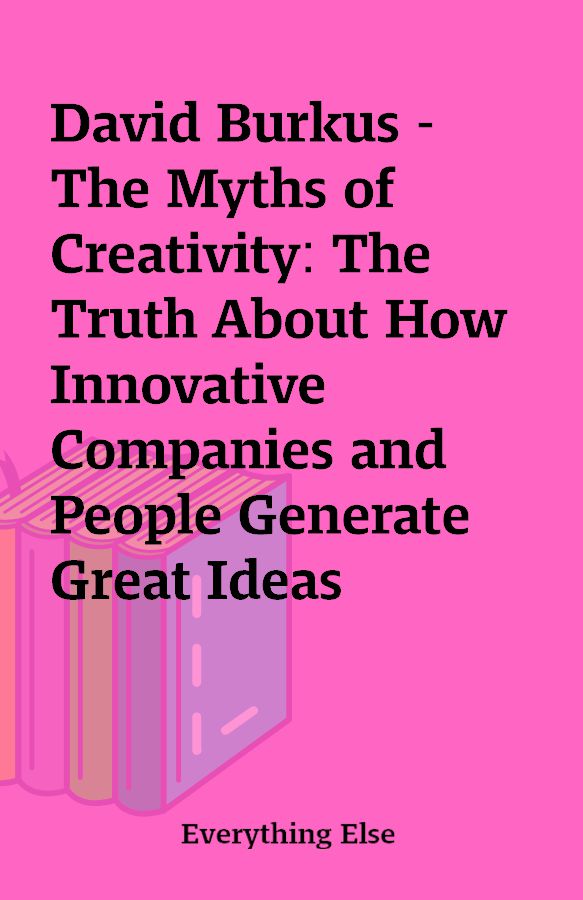David Burkus – The Myths of Creativity: The Truth About How Innovative Companies and People Generate Great Ideas
The Myths of Creativity – David Burkus.epub
[1 eBook – 1 Epub]
Description
How to get past the most common myths about creativity to design truly innovative strategiesWe tend to think of creativity in terms reminiscent of the ancient muses: divinely-inspired, unpredictable, and bestowed upon a lucky few. But when our jobs challenge us to be creative on demand, we must develop novel, useful ideas that will keep our organizations competitive. The Myths of Creativity demystifies the processes that drive innovation. Based on the latest research into how creative individuals and firms succeed, David Burkus highlights the mistaken ideas that hold us back and shows us how anyone can embrace a practical approach, grounded in reality, to finding the best new ideas, projects, processes, and programs.Answers questions such as: What causes us to be creative in one moment and void in the next? What makes someone more or less creative than his or her peers? Where do our flashes of creative insight come from, and how can we generate more of them?Debunks 10 common myths, including: the Eureka Myth; the Lone Creator Myth; the Incentive Myth; and The Brainstorming MythWritten by David Burkus, founder of popular leadership blog LDRLBFor anyone who struggles with creativity, or who makes excuses for delaying the work of innovation, The Myths of Creativity will help you overcome your obstacles to finding new ideas.Editorial ReviewsAmazon.com ReviewQ&A with David Burkus, author of The Myths of CreativityDavid BurkusWhy is creativity in the business world so vague and inaccessible?The roots of it go back to our tendency to develop myths in the first place. When we as humans don’t understand how something works, we usually develop some kind of educated guess or heuristic about it. Over time these heuristics become fully entrenched myths that can be hard to abandon. In the case of business, so much of “management” education teaches us to rely on solid principles and formulas that have been refined through the decades. Creativity, until recently, wasn’t like that. It was hard to reduce to a set of defined metrics, and so many in business abandoned it all together, relying on outsourcing when needed to “creative” firms. Thankfully, decades of psychological insight into creativity have given us a means to study where it comes from and how to enhance it for greater innovation.How can managers in the business world better understand what creativity is and where it comes from?It starts by leaving the myths behind. The stories and heuristics we used to explain creativity and innovation aren’t necessary and, in many cases, are contradictory to the empirical evidence. By beginning to study that evidence, managers will develop a better understanding of how great ideas develop and how to develop organizations that can consistently produce great ideas. Innovation will follow.How did you determine the ten myths of creativity?The myths actually grew from some research I began during my final few years of doctoral studies. I had focused on the relationship between leadership and innovation and was pretty orientated with what the literature had to say about how innovation happens. However, as I looked at how most organizations operated, they appeared to be misaligned with the evidence. As I looked deeper into these faulty beliefs and the motivations behind them, I came to realize how similar they were to the Greeks’ mythology around creativity. No one still believes in the nine muses, but they do tell themselves a whole new set of myths of creativity.Which myth is the one that almost all companies subscribe to and can be the most crippling?I close the book with a discussion of the “Mousetrap Myth,” the belief that once a good idea is generated, getting it implemented is easy. This comes from the maxim “If you build a better mousetrap, the world will beat a path to your door.” It turns out that this saying is quite backwards. In most cases, when a great idea or innovation is presented to the world it is typically rejected at first. The digital camera, personal computers, and even talking pictures were all at first dismissed as nonsense. In most cases, if you build a better mousetrap, the world will beat you down and ignore your idea. The reason for this is most likely a psychological bias we all share against creative ideas. We say we want more creativity, but when we are presented with new ideas, we have a hard time recognizing their utility. This is something I see in almost all organizations.Great ideas come from all levels of an organization, but pushing them through this bias at every level of the hierarchy is a long and arduous process that most people give up in the middle of. In this way, most organizations kill their most of their innovative ideas. Not all organizations are afflicted, though, many organizations have taken deliberate steps to counteract the bias and cultivate great ideas. Not surprisingly, those are the organizations seen at the top of so many “most innovative” or “great place to work” lists and experiencing outstanding growth in their industry.Review“An engaging book that makes its case in good, clearlanguage… [Burkus] forces us to challenge some widely heldassumptions.”—Morgen Witzel, The Financial Times“Outlines how anyone—especiallyentrepreneurs—can embrace a practical approach to finding thebest kind of mojo for new projects, processes andprograms.”—Entrepreneur.com (selected as a “Best Business Bookto Get Cozy With This Fall”)“We may no longer literally worship the Muses, but themyths surrounding creativity continue to delude us. In this smartand urgent book, David Burkus explodes these myths and replacesthem with the scientific results of modern research on creativityand innovation.”—Daniel H. Pink, author, To Sell is Human andDrive“Creative potential is all too often held captive bymisconceptions. Burkus tackles the myths head on and digsinto the true underpinnings of creative insight. It turns outthat great ideas are within your grasp as soon as you take thereins. Read this book to free yourself of the myths and assumptionsthat burden your true creative potential.”—Scott Belsky, author, Making Ideas Happen andcofounder & CEO, BEHANCE“Through rigorous research and engaging stories, Burkusdebunks the myths of creativity and illuminates a creative processthat makes ingenuity accessible to all. If you seek a moreinnovative company, The Myths of Creativity is a brilliantfind.”—Liz Wiseman, author, Multipliers, and founder, TheWiseman Group“David Burkus is an important new voice, both as a scholarand storyteller, as well as a commentator of the emerging‘GenEntrepreneur’ in America.”—Peter Sims, author, Little Bets, and founder, BLKSHP“The Myths of Creativity speaks the truth. The processes, environments, and organizational structuresthat foster creativity, as well as the obstacles that inhibitinnovation, are laid bare. David Burkus uncovers the hiddenelements which have been at the core of Continuum’s innovationprocess, driving us to find better answers to the biggestquestions.”—Gianfranco Zaccai, president, chief design officer, andfounder, Continuum“You must embrace your creative ability in order to thrivein today’s marketplace. David Burkus swiftly and effectivelydebunks the myths that limit your creative firepower.”—Todd Henry, author, The AccidentalCreativeFile Size: 897 KBPrint Length: 225 pagesPublisher: Jossey-Bass; 1 edition (September 26, 2013)http://www.amazon.com/Myths-Creativity-Innovative-Companies-…
You must be logged in to post a review.






Reviews
There are no reviews yet.